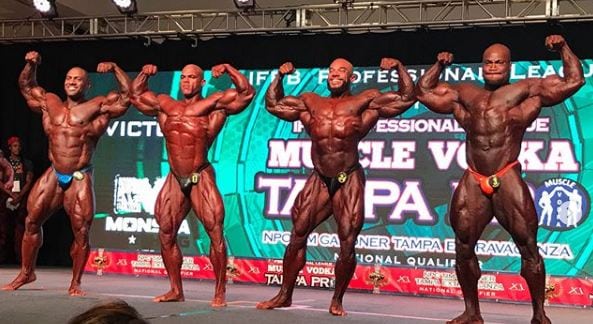IFBB Tampa Pro
Wings of Strength IFBB Muscle Vodka Tampa Pro has come to an end.


The International Federation of BodyBuilding and Fitness (IFBB), headquartered in Las Rozas (Madrid), is an international professional sports governing body for bodybuilding and fitness that oversees many of the sport’s major international events, notably the World and Continental Championships.
History
In 1946, the IFBB Tampa was founded by brothers Ben and Joe Weider in Montreal, Canada under the name “International Federation of Bodybuilders”. The two founding countries were Canada and the United States. Mr. Ben Weider of Canada served as the first IFBB President. In 1965 the IFBB Mr. Olympia was held, which was the IFBB’s first contest.[5] From 1966 to 1970, the Federation experienced rapid growth as Joe and Ben Weider promoted the organization globally. By 1970, the IFBB had directors in more than 50 countries worldwide and the IFBB had its footprint in Africa, Asia, Europe, Australia, North America, and South America.[6]
On September 4, 1970, the IFBB Tampa held its 1st International Congress in Belgrade, Yugoslavia where a Constitution was adopted and an Executive Council.[6] In 1971 Jim Morris became the first openly gay IFBB professional bodybuilder.[7] Also in 1971, the IFBB became a member of the Global Association of International Sports Federations (GAISF), now SportAccord. Upon receiving membership, the IFBB became the only official representative of bodybuilding to be recognized by world sports authorities. From the 1980s to his death in 2008, IFBB president Ben Weider petitioned the IOC for the inclusion of bodybuilding in the Olympic Games.[8] Although bodybuilding had never been on the Olympic Program,[9] in 1998, the IOC granted the IFBB provisional recognition, which lasted nearly four years, but was withdrawn in 2001.[10][11]
In 2004, the IFBB Tampa has renamed the International Federation of Bodybuilding and Fitness but retained the “IFBB” abbreviation. The following year, the IFBB adopted new IFBB Anti-Doping Rules following the World Anti-Doping Code. The IFBB Professional Section was legally split from the IFBB to form the IFBB Professional League, its own legal entity with its own rules and regulations. In turn, the IFBB Tampa Constitution became a governing document for amateur sports only.[6] In 2006, after 60 years, Ben Weider resigned from his role as president, and Dr. Rafael Santonja from Spain was elected as the new president. The IFBB headquarters were moved to Las Rozas (Madrid), Spain. In 2010, Santonja was re-elected for a second term, and in 2014, he was re-elected for a third time at the IFBB World Congress in Brasilia
The IFBB Tampa is registered under Spanish law as a nonprofit legal entity. The IFBB has a constitution, technical rules, anti-doping rules, and a democratically elected executive council with four-year terms. The IFBB meets annually at its International Congress, held in conjunction with the Men’s World Bodybuilding Championships.[4] The IFBB is a founding member of the International World Games Association (IWGA) and also a member of the International Council of Sport Science and Physical Education (ICSSPE), the International Pierre de Coubertin Committee, and the International Council of Coach Education (ICCE). The IFBB is recognized by the Olympic Council of Asia (OCA), the Supreme Council for Sport in Africa, and the Association of Pan-American Sports Federations (ACODEPA).[8] The IFBB is also recognized by some 90 National Olympic Committees.[3] The IFBB participates in several Regional Games recognized by the IOC including the Southeast Asian Games, the Asian Games, the South American Games, the Asian Beach Games, the Arab Games, the Pacific Games, the African Games, and the World Games.[8] The IFBB has also participated in the Central American Games














